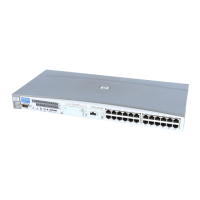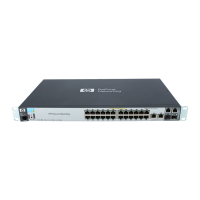100 • SSL Reference HP NonStop SSL Reference Manual
Implementation Overview
Cipher Suites
HP NonStop SSL uses the SSL protocol - as used in standard browsers and servers - for session security. It supports SSL
2.0, SSL 3.0 and the latest version SSL 3.1, which has been standardized by the IETF as Transport Layer Security (TLS)
protocol. This protocol allows for negotiating cipher suites for secure exchange of data as well as exchanging the
necessary secrets at the beginning of each session in a way which is particularly strengthened against replay, insertion
and man-in-the-middle attacks.
Note: Usage of SSL 2.0 is not recommended as it has some serious design flaws.
The selection of cipher suites is configurable, in order to make our solution tolerable to the needs of individual security
requirements:
• RSA certificate-based key-exchange, where the server certificate is validated in the SSL client.
• Either of 3-DES, RC4 or AES as bulk-ciphers.
• Either of HMAC-SHA or HMAC-MD5 as message authentication codes.
• The actual choice of the cipher suite is at the discretion of the server and configurable.
The key lengths for symmetric encryption are:
• (Triple-DES) 3x56 = 168 bits.
• RC4 = 128 bits
• AES = 128 or 256 bits
The key lengths for message authentication are:
• (HMAC-MD5)= 128 bit
• (HMAC-SHA)= 160 bit
The cipher block chaining mode (CBC) in 3-DES guarantees the utmost security against replay/insertion as well as
brute force attacks. At the current state of computer technology triple encryption is no longer a (speed) obstacle.
The authenticity of messages is granted by the 160 bit SHA hash algorithm. (HMAC-SHA) or by the 128 bit MD5
hash algorithm (HMAC-MD5).
Modulus lengths of up to 8192 bits are supported for public key values.
Auditing
An indispensable part of every security strategy is Security Auditing. The TLS protocol defines 23 Alert Messages,
which may be sent or received. All these alerts are handled by HP NonStop SSL; most of them are fatal for the
connection. HP NonStop SSL logs these alerts to the configured log targets e.g. on the console.
X.509 Certificates
Certificates are a form of digital id issued by a certificate authority. A certificate authority signs a certificate with its
private key, vouching for the correctness of the certificate contents. Certificates used with SSL are standardized by the
X.509 specification. It is possible to built hierarchies of certification authorities, where the top level authority is called
the root CA. The root CA's certificate is issued by the root CA itself; it is a so called self-signed certificate.
For SSL, the certificates are used to provide mutual authenticity. Before establishing a session, clients can authenticate a
server to ensure it is connecting to a trusted site (SSL server authentication). In this case the server presents its "server

